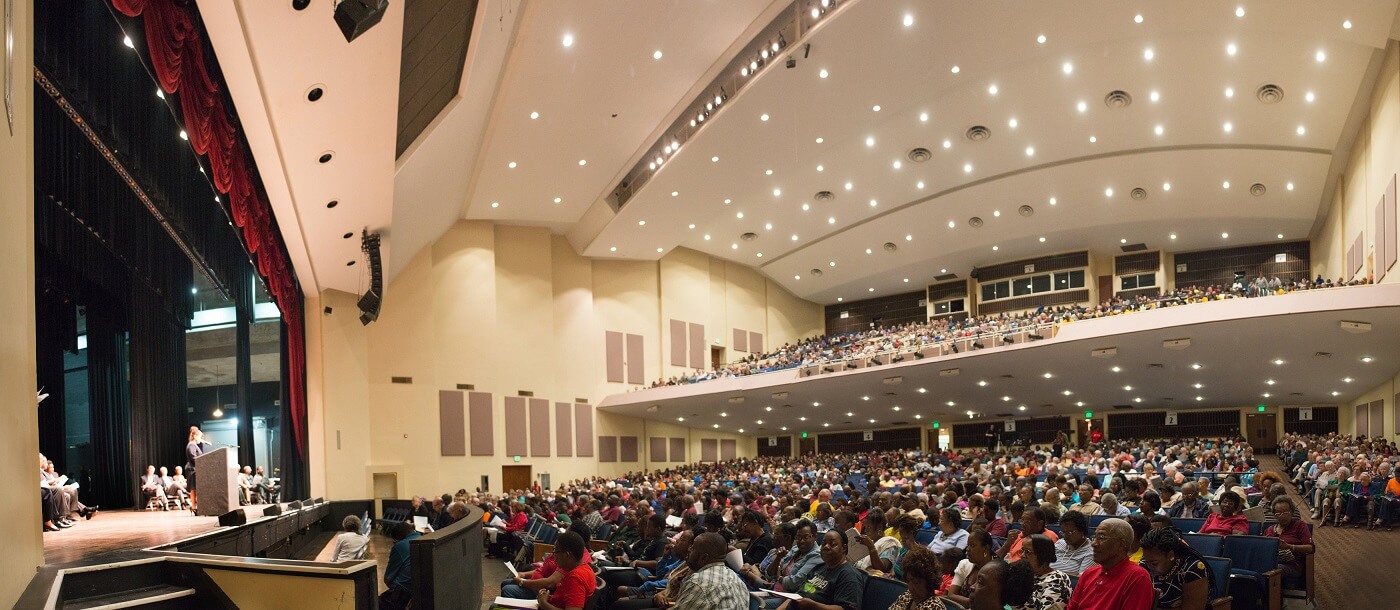March 14, 2018. The Lakeland Ledger.
LAKELAND – Fourteen hundred church congregants cheered when Lakeland Mayor Bill Mutz said he would meet their demands to develop housing for homeless children and families in Polk County.
Mutz was the only government official who attended the Polk Ecumenical Action Council for Empowerment’s 18th annual event Monday night. The social justice group was seeking commitments from eight officials on three goals: housing for homeless children, funding for two mental health teams to serve seriously ill children and adults, and continued diversion of children from the court system.
The Nehemiah Action night was held at Resurrection Catholic Church and involved members of 18 churches from Lakeland, Winter Haven, Bartow and Lake Wales.
Asked four “yes” or “no” questions, Mutz said:
‒ He “absolutely”recognizes there is a crisis in Lakeland for children and families who are homeless or on the brink of homelessness, adding, “We have had a homeless family of five living in our home for 18 months.”
‒ He will direct Lakeland City Manager Tony Delgado to identify city-owned land that could be incentivized for development for affordable housing for homeless families with children, adding that he began working on homeless issues 15 years ago and the city now has land allocated for 70 units and will continue to work on the issue.
‒ He will work with the Florida Housing Coalition to develop a strategic plan to produce 500 units of housing over the next five years for homeless families served by Polk County schools.
‒ He will meet with PEACE leadership in August to share a draft of the strategic plan.
Mutz’s pledges came after brief statements by Polk School Superintendent Jacqueline Byrd and DeeDee Wright, homeless liaison for Polk County schools, along with others.
Wright said that last year the Polk School District identified 3,395 homeless children and the Lake Wales Charter system identified 270 additional homeless children. As of March 5 of this year, the district had identified 3,875 homeless children, “which is a 45 percent increase over the same time last year. That is enough to fill Lakeland High, George Jenkins High and part of Bartow High School,” she said.
Byrd said, “I welcome this conversation. These children did not choose the path of homelessness. It chose them.”
The Rev. Ben Turner of Strong Tower Church gave a synopsis of PEACE’s yearlong research into the issue of homeless children and said that the law defines homelessness as those without a fixed, adequate roof each night, including those living in tents, on the streets, in campgrounds, in motel rooms and those doubling up with other families.
“Housing in Polk County is not easily affordable: here, a parent must work full time and make $21.37 per hour to afford a three-bedroom apartment,” Turner said. ″Meanwhile, homeless children’s families have virtually no way out of their situation because every waiting list for public and income-based housing in Polk County is closed.”
To visualize the depth of the problem, the Rev. David Averill of St. John’s United Methodist Church asked the audience members who packed the Lakeland church’s massive sanctuary to stand, saying, “Each of us represents a child in the city of Lakeland who is homeless.″
“These are the invisible homeless. Thousands of children sleep in cars, on sofas and on living room floors. All our children deserve hope.”
Averill said Winter Haven Mayor Brad Dantzler had met with PEACE representatives and is open to meeting with them again, however, he sent regrets about not attending Monday night’s event, saying he had a City Commission meeting.
The Rev. Ronnie Clark of Hurst Chapel AME church spoke about PEACE’s long-sought funding for for two assertive community treatment teams of professionals who would respond around-the-clock with comprehensive, intensive treatment and support for 100 adults and 75 children with severe mental illness and trauma. The county has two such teams now, but they are full and reserved for those being diverted from or discharged from state hospitals, he said.
After voters approved continuation of the county’s half-cent sales tax for indigent health care, county commissioners chose to fund other projects and have refused PEACE’s request to release money from the $35 million in the sales tax reserves fund to pay for the ACT teams, Clark said.
Pastors from five churches led prayers to “move commissioners to respond to this need.”
None of the five county commissioners accepted PEACE’s invitation to Monday’s event, Clark said.
“If they won’t come to our meetings, we will go to theirs,” he said, and encouraged audience members to show up en masse at the March 20 County Commission meeting.
PEACE leaders also encouraged Lakeland residents to call and write Police Chief Larry Giddens to expand the Lakeland Police Department’s use of a program to divert children from arrest to Teen Court after being picked up for minor offenses. Statistics compiled by PEACE show that since the program started in late June through the end of 2017, Polk County Sheriff’s Office had diverted an average of 75 percent of first-time misdemeanor offenders, Winter Haven police an average of 76 percent, Haines City police an average of 72 percent and Lakeland police an average of 44 percent.
“Just because a child lives in Lakeland does not mean he should not have the same opportunity for diversion,” said the Rev. Melissa Stump of First United Methodist Church, Lakeland.
View original article.






